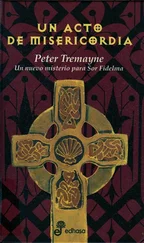Peter Tremayne - Act of Mercy
Здесь есть возможность читать онлайн «Peter Tremayne - Act of Mercy» весь текст электронной книги совершенно бесплатно (целиком полную версию без сокращений). В некоторых случаях можно слушать аудио, скачать через торрент в формате fb2 и присутствует краткое содержание. Год выпуска: 2011, Издательство: St. Martin, Жанр: Исторический детектив, на английском языке. Описание произведения, (предисловие) а так же отзывы посетителей доступны на портале библиотеки ЛибКат.
- Название:Act of Mercy
- Автор:
- Издательство:St. Martin
- Жанр:
- Год:2011
- ISBN:нет данных
- Рейтинг книги:4 / 5. Голосов: 1
-
Избранное:Добавить в избранное
- Отзывы:
-
Ваша оценка:
- 80
- 1
- 2
- 3
- 4
- 5
Act of Mercy: краткое содержание, описание и аннотация
Предлагаем к чтению аннотацию, описание, краткое содержание или предисловие (зависит от того, что написал сам автор книги «Act of Mercy»). Если вы не нашли необходимую информацию о книге — напишите в комментариях, мы постараемся отыскать её.
Act of Mercy — читать онлайн бесплатно полную книгу (весь текст) целиком
Ниже представлен текст книги, разбитый по страницам. Система сохранения места последней прочитанной страницы, позволяет с удобством читать онлайн бесплатно книгу «Act of Mercy», без необходимости каждый раз заново искать на чём Вы остановились. Поставьте закладку, и сможете в любой момент перейти на страницу, на которой закончили чтение.
Интервал:
Закладка:
‘I hear you, Sister Fidelma,’ he replied. His face was still serious but Fidelma could not help feeling that he was secretly laughing at her discomfiture. Then he intoned softly:
‘ … do not think lightly of the Lord’s discipline,
Nor lose heart when He corrects you;
For the Lord disciplines those whom He loves.
He lays the rod on every son and daughter whom He
acknowledges.’
Fidelma suppressed her annoyance.
‘Hebrews, twelve,’ she stated with a tight smile meant to demonstrate that he was not going to impress her with his knowledge of Scripture. ‘But now, I have some questions that I must ask you on behalf of Murchad, the captain.’
‘I know, as I have already said. Sister Ainder has spoken about your enquiries.’
‘Good. You are older than most of your party, Brother. Why did you come on this pilgrimage?’
‘Need I make an answer?’
‘I have no compulsion to make you do so.’
‘That is not what I meant. I meant that it should be obvious.’
‘I take it that you are saying that your pilgrimage was made because of religious conviction? Surely that is obvious. But why did you choose to join Sister Canair’s group? They are quite young, with the exception of Sister Ainder. And according to your view, your fellow travellers are not truly concerned with religion.’
‘Sister Canair’s group was the only party journeying to the Holy Shrine of St James. Had I not travelled with them, I might not have found group for another year at least. There was a place for me and so I joined them.’
‘Did you know Sister Canair and the others before you joined them?’
‘I knew none of them except those from my own Abbey of Bangor.’
‘Being Brothers Cian, Dathal and Adamrae?’
‘Just so.’
‘You have indicated that you found them an ill-assorted group.’
‘Most certainly.’
‘Does that opinion include Sister Muirgel?’
Brother Tola opened his eyes wide and a spasm contorted his features.
‘A most distasteful young woman! I disliked her most of all!’
Fidelma was surprised at the vehemence in his voice.
‘Why so?’
‘I remember when she first tried to dominate our company of travellers on the basis that her father had been chieftain of the Dal Fiatach. He was nothing to boast about — an evil rascal out for power and self-aggrandisement. Sister Muirgel was the daughter of her father.’
‘With your views, surely that would make you hesitate before joining Sister Canair’s group?’
‘I did not know that Sister Muirgel was part of the group until weset out. I decided that I could avoid her immediate company on the journey.’
‘Did you know her personally, or only by the fact that she was the daughter of a chieftain whom you disliked?’
‘I knew her from the stories that circulated within our abbey.’
‘What stories?’ Fidelma was curious.
‘Of her promiscuity, of her unchaste relations with other Brothers. Of the way she used people for her own ends, and the fact that she was the opposite to a truly religious person.’
‘That is a harsh judgement of a Sister,’ observed Fidelma.
‘One greater than I will be her judge. “Look eagerly for the coming of the Day of Judgement and work to hasten it on; that day will set the heavens ablaze until they fall apart, and will melt the elements in flames. But we have His promise, and look forward to new heavens and a new earth which is the home of justice”.’
Fidelma was not impressed with his quotation from the Holy Book and ignored it.
‘How is it that such stories came to circulate in your Abbey of Bangor when Muirgel was a religieuse at Moville?’
‘There was plenty of intercourse between our two communities. Our Abbot often had cause to send to his Brother the Abbot of Moville. Once he had to inform him that he had heard such tales and that he must not let his community descend into a sink of iniquity.’
‘How did the Abbot of Moville respond?’
‘He did not.’
‘Perhaps he thought that it was not the place of the Abbot of Bangor to tell him how to lead his community?’ Fidelma smiled without humour. ‘Anyway, you formed a harsh judgement of Sister Muirgel.
Brother Tola nodded and intoned:
‘A prostitute is a deep pit,
A loose woman, a narrow well;
She lies in wait like a robber …’
Fidelma interrupted him sharply.
‘Apart from the fact that I seem to recall that Christ said harlots would enter heaven before some religious leaders, are you now saying that Sister Muirgel was a harlot ?’
Tola merely continued his quotation from the Book of Proverbs.
‘I glanced out of the window of my house,
I looked down through the lattice, and I saw among simple
youths,
There amongst the boys I noticed
A lad, a foolish lad,
Passing along the street, at the corner,
Creeping out in the direction of her house
At twilight, as the day faded,
At dusk as the night grew dark;
Suddenly a woman came to meet him,
Dressed like a prostitute, full of wiles,
Flighty and inconstant,
A woman never content to stay at home,
Lying in wait at every corner,
Now in the street, now in the public squares.
She caught hold of him and kissed him;
Brazenly she accosted him and said,
“I have had a sacrifice, an offering to make, and I have paid my
vows today” …’
Fidelma held up a hand to quell his sonorous recital and finally had to cut in sharply.
‘I think I can also recall the words of Proverbs, seven. What are you saying by reciting that passage? You disapproved of Sister Muirgel because she had relationships with men, or that she was selling her body to whoever paid? Let us be precise about it. What is your definition of a harlot?’
‘You are the lawyer, you may interpret as you please. All I say is let the simple fools follow her like oxen on their way to the slaughterhouse.’
She had heard the same narrow views preached before by several religieux who argued for the reform of the Irish Church in favour of the concepts of Rome. She decided to clarify his attitude.
‘Tell me, Brother Tola, are you one of those who believe that the religieux should be celibate? I have often heard the argument at Rome.’
‘Does not Matthew say that our Lord Christ ordained celibacy for His followers?’
It was a favourite argument of those who wished all religieux to take an oath of celibacy. Fidelma had heard it many times and had no problem about the answer.
‘When the disciple asked Christ whether it was better not to marry, He replied that celibacy was not something everyone could accept; itwas only meant for those for whom God had appointed celibacy. His words were that while some are incapable of marriage because they were born so, or were made so by men, there were, indeed, others who had themselves renounced marriage for the sake of the Kingdom of Heaven. He left it as the choice of the individual. Let those accept it who can. So far the churches of Christ have adhered to that free choice …’
Tola’s features expressed irritation. He obviously did not like being out-quoted from the Scriptures.
‘I accept the teachings of Paul on this matter. Celibacy is the ideal of a Christian victory over the evil of the world and must become the main basis of religious life.’
‘There is a lobby in Rome who believe in this celibacy,’ agreed Fidelma, her tone indicating that she did not think much of the argument. ‘But if Rome accepts it as a dogma of the Faith, they say that the Faith stands against that which God created. Had God wanted us to be celibate, he would have made us so. However, instead of theology, I would prefer to return to the matter in hand. You clearly did not like Sister Muirgel.’
Читать дальшеИнтервал:
Закладка:
Похожие книги на «Act of Mercy»
Представляем Вашему вниманию похожие книги на «Act of Mercy» списком для выбора. Мы отобрали схожую по названию и смыслу литературу в надежде предоставить читателям больше вариантов отыскать новые, интересные, ещё непрочитанные произведения.
Обсуждение, отзывы о книге «Act of Mercy» и просто собственные мнения читателей. Оставьте ваши комментарии, напишите, что Вы думаете о произведении, его смысле или главных героях. Укажите что конкретно понравилось, а что нет, и почему Вы так считаете.











